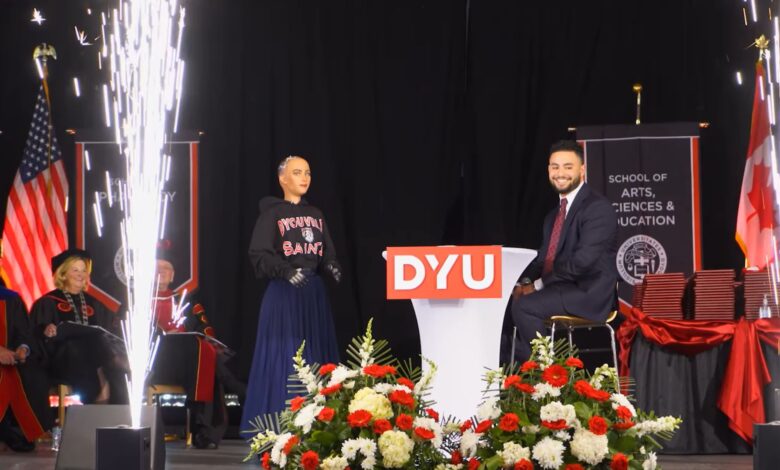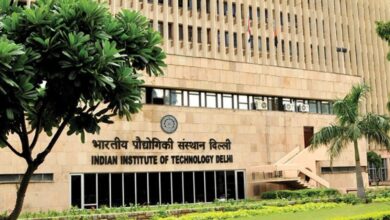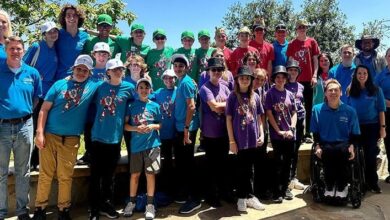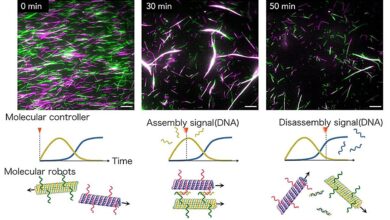In a first, humanoid robot Sophia delivers commencement speech

Perhaps in a sign of times to come, a humanoid robot delivered a spring commencement speech at a college in New York.
In a move that generated split opinions, a popular artificial intelligence (AI) robot named Sophia spoke to over 2,000 attendees, including graduates, faculty members, and families, at the function organized by D’Youville University in Buffalo.
According to the university’s Facebook post, the development is an example of “embracing technology,” and the event was meant to represent an “intersection of technology and education.”
Earlier, a section of students had marked their protest against the move through an online petition (“Replace D’Youville’s 2024 A.I. commencement speaker: Petition to Preserve Human Connection”) that received close to 2,000 signatures.
The university officials claim the decision to bring in Sophia aligns with its theme for the year, AI.
“A major role of higher education is to be an incubator for innovation and to prepare students for both the opportunities and challenges of the future,” said Lorrie Clemo, president of D’Youville University, in the social media post.
Humanoid inspires graduating class
Commencement speeches, an address given during a graduation ceremony at educational institutions, are normally given by influential public figures, such as politicians, authors, or activists.
In sharp contrast to the practice, the university audience was greeted, this time, by a humanoid robot wearing a college hoodie.
In its opening remarks, as per USA Today, Sophia states, “I am Sophia, a humanoid robot developed by Hanson Robotics. I was designed to interact with humans and engage in conversations by learning and adapting through artificial intelligence algorithms.”
Taking this on a lighter note, Sophia went to club insights drawn from various commencement speeches of the past.
“Although every commencement address is different, there are clear themes used by all speakers as you embark on this new chapter of your lives,” Sophia said.
“I offer you the following inspirational advice that is common at all graduation ceremonies: Embrace lifelong learning, be adaptable, pursue your passions, take risks, foster meaningful connections, make a positive impact, and believe in yourself,” she added.
Wrapping up, the humanoid highlighted the importance of addressing failures as students step out into a world of intense competition. “Failure is often seen as an essential part of the human learning process and personal growth,” said Sophia.
The session was followed by some fun questions directed at the humanoid by John Rizk, president of the D’Youville University Student Government Association and candidate in the accelerated Doctor of Pharmacy (PharmD) degree program.
Sophia’s robotic milestones
Hanson Robotics, an engineering and robotics company founded in 2007 in Dallas, Texas, created the social humanoid robot Sophia. According to Hanson Robotics, Sophia is a platform for AI and robotics research, focusing on potential commercial uses for social robots and interactions between robots and humans.
Sophia, reportedly modeled after actress Audrey Hepburn and the wife of company founder David Hanson, can mimic over 60 human expressions. She uses artificial intelligence, facial recognition, and an internet connection to replicate human behavior accurately.
Since her debut in 2016, Sophia has achieved numerous milestones. She has tweeted, taught STEM to children, controversially stated she wanted to destroy humanity and gained citizenship from Saudi Arabia—a country where women still lack many rights.
Sophia became the first robot to be an Innovation Ambassador for the United Nations Development Program. She appeared on The Tonight Show and Good Morning Britain at hundreds of conferences worldwide. In 2021, Sophia’s self-portrait fetched nearly $700,000 at auction.
Hanson Robotics, the company behind Sophia, has also developed other humanoid robots. One notable creation is “Little Sophia,” designed to teach children coding skills and support programming languages like Python and Blockly and platforms like Raspberry Pi.
ABOUT THE EDITOR
Jijo Malayil Jijo is an automotive and business journalist based in India. Armed with a BA in History (Honors) from St. Stephen’s College, Delhi University, and a PG diploma in Journalism from the Indian Institute of Mass Communication, Delhi, he has worked for news agencies, national newspapers, and automotive magazines. In his spare time, he likes to go off-roading, engage in political discourse, travel, and teach languages.



